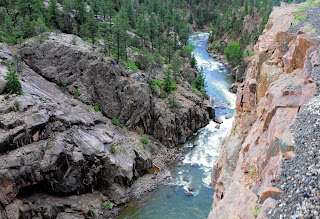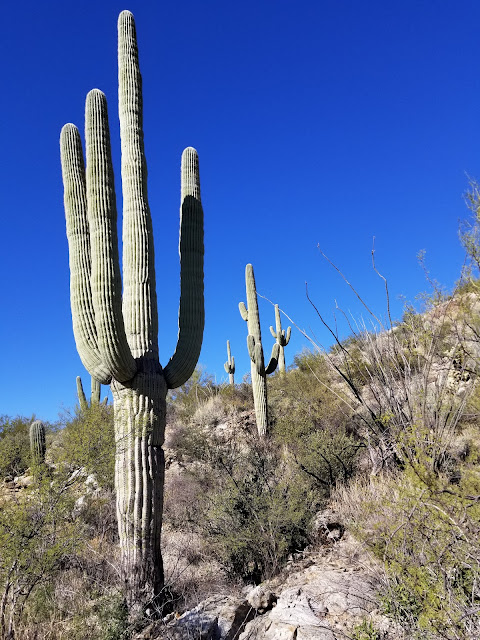In the Old West
May 20, 2018
We have friends, Carol and Jerry, that are slightly older
than us, that bike 35 miles a day several times a week. We had dreams of
getting “in shape” this year. But first we made the mistake of bringing only a
bike rack for the RV and not for the car. Left that one in storage. That meant
we could not bike unless we started from
the RV park. And only in Everglades City was that possible. So the bikes went
unused and we stuck to walks and hikes.
While we were in San Antonio, Steve bought a new bike rack
for the car. He ordered it online and
had it sent to the RV park. Logistics is
a little harder when you are constantly traveling. Despite estimated shipping times, it is not
always possible to have packages arrive where we are. Steve has learned one of the worst ways to
have something shipped is to pay for expedited delivery. He has done this twice and each time the
delivery took longer than standard delivery.
Our advice is to not mess with a company’s routine.
One day while I was in North Carolina Steve used the bike
rack for the first time. It broke within
the first 5 minutes of use. This was not
a cheap bike rack. It was a Thule and
cost $150. The plastic tabs that engaged
the elastic straps broke. They sheared
off like they were made of putty. His
bike almost fell off the back of the car while he was going 65 down I-40 west of
Albuquerque. What a mess that would have
been. It would have made for a more
exciting story but it also could have resulted in tragedy. That rack went back to the seller and we
ended up with an old bike rack found on Craigslist. Should have gone that route from the
beginning.
So in Santa Fe we biked about 6 miles one direction on
Sunday afternoon. We attributed my inability to go further to the change in
elevation. On Monday when we started in the other direction, at first it was
exhilarating because it was mostly downhill and flying downhill for 3 miles
with blue sky above and mountains in the distance was fun until you remembered
you had to return. Those 3 miles back going uphill were really hard on me. I am
blessed at my age to not have joint aches and pains but I was reminded that in
the past few years I have sat too long in front of the computer too many days.
Spent most of the next couple of days just resting and sightseeing in Santa Fe.
Driving from New Mexico into Colorado the scenery starts
changing fairly drastically. The mountains are higher with snow tops.
Everything is greener. There’s even lilacs blooming along-side
Friday morning we drove to downtown Durango to catch the bus
up to Silverton and then to ride the steam engine railroad back down. Several
of you had recommended it and we are glad you did. Taking the bus had some
scary moments. The driver- a woman who had to be over 70- talked the entire
trip giving history and stories of the railroad. Sometimes we just wanted her
to shut up and concentrate on driving because we were on roads that were just
shelves with deep canyons below and the bus seemed to be hanging out over the canyons
sometimes. But she managed to get us up to Silverton in one piece. The scenic
mountains around us were so amazing.
Silverton was a mining town for many sorts of ores: silver
(mostly), gold, zinc, manganese, and the railroad was built to aid the
transport of the ores to Durango and to Denver for smelting. Silverton had many
saloons and bordellos and some of them are still standing. We ate lunch at an old
saloon that had many taxidermy animals of all sizes on the walls. Bear, bobcat,
deer, elk, beaver, turkey, snakes, etc.
The first shop I went into in Silverton was a shop selling
quilted items of all sizes. I had a good time talking to the woman who owned it
and who had made most everything in the shop. She had a modern computerized
Singer Sewing machine and one of those huge computerized embroidery machines.
She has a long-armed quilting machine in her home. She lives there only April
through October because “the winters up here are too hard”.
Winter up in these mountains can bring around 300 to 400
inches of snow. And the train only goes halfway to Silverton in the winter. So
the barely 300 residents have to be well-prepared. In the summer the population
grows to around 1200 with the staff hired to serve people like us who come to shop
and eat.
We boarded the train for the 3 ½ hour trip back to Durango. The train sways a
bit and the cars are part of the originals. Even the steam engine locomotive
was restored from the junk pile in the 90’s. Again the scenery is spectacular
and the stories of men dynamiting into the sheer rock mountainside to make the
shelf for the railroad were fascinating. Again, our guide and story-teller
looked older than us, dressed like the railroad’s founder, General Palmer, so
we are beginning to think tour-guiding is a favorite job for retirees.
The photo shows the train running along a rock ledge about
400 feet above the Animas River. This
terrain goes on for miles. The ledge was
not a natural feature of the canyon. It
had to be blasted out of solid rock with dynamite. Most of the workers hired to lay the track
made $2 a day. The men who worked with
dynamite made $4 a day because of the danger.
The dynamite had to be inserted into holes cut by hand into
the rock. The standard pattern for
blasting was a center hole surrounded by four holes in a diamond pattern and an
arc of 13 holes above and below the
diamond. The holes were all made with
hammer and chisel. The rock debris was
then shoveled over the ledge into the river.
The train had to stop for water on the way and on the way
back. The train needs 6 tons of coal and 10,000 gallons of water for a
roundtrip.
If you ever are in the Durango area you must take the train
to Silverton and visit the railroad museum.
It preserves an important and impressive bit of history of the old west.
Thoughts today: Today there is a memorial service for an old friend back in Virginia. I last saw him at our wedding in September. Many good memories of good times in the past. I think we are at that age where we realize every day from now on is a gift to treasure.
Edited by Steve - as usual.






Glad you enjoyed the train. When Lib and I took this trip many years ago we were walking through the town of Silverton when we heard a voice call “Bill Kinzie! “ from across the street. Couldn’t imagine who would know us in this remote little town. By coincidence another Roanoke couple from First Baptist in Roanoke were there and had driven to the town
ReplyDelete